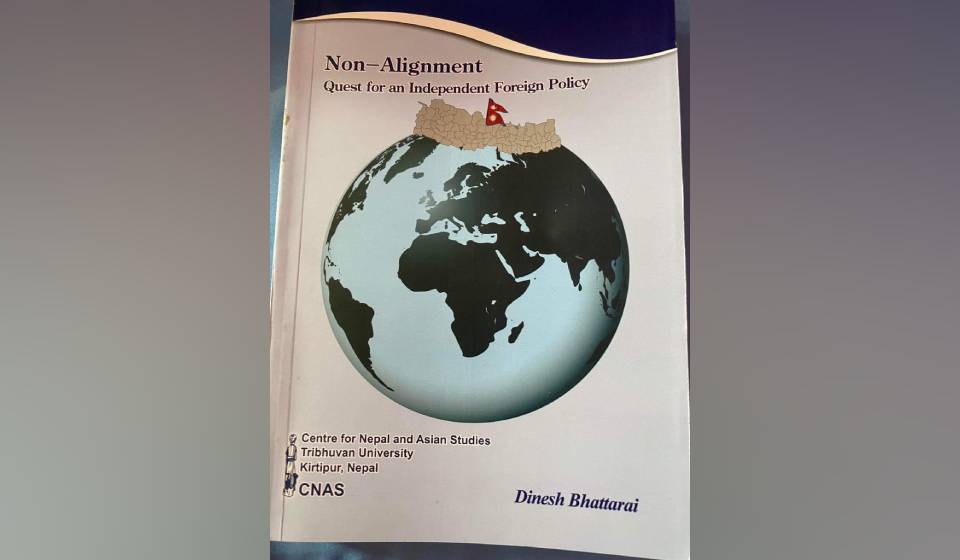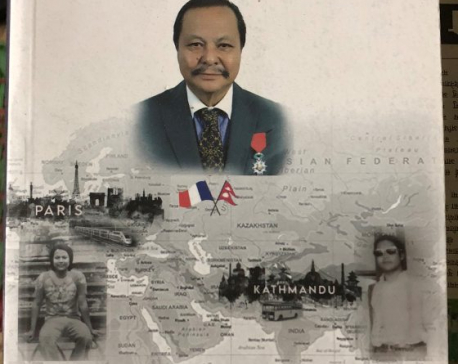
OR
Book Review
Non-Alignment: A Necessity or an Appeal to Tradition?
Published On: September 3, 2023 09:15 AM NPT By: Kasam Pokhrel

The world is passing through a geopolitical recession. The Cold War 2.0 debate has heated up the global setting. Against this backdrop, major powers are observed to have intensified their worldwide engagements to an unprecedented extent. February 24, 2022, added yet another element of uncertainty to the intricacy of this already complicated phenomenon. In today's transnational security order marked by unipolarity and international economic order characterized by multipolarity, we witnessed 141 countries casting their votes in the United Nations General Assembly, condemning Russia's invasion of Ukraine. In the meantime, one may ask -why have these states not supported the diplomatic and economic sanctions imposed on Russia?
Although terms such as "multi-alignment", "issue-based alignment" and so forth are in vogue in the lexicon of external engagement, why is it often argued that no foreign policy tool could be more suitable for states like Nepal than non-alignment? To let you get close to the answers, Ambassador Dr Dinesh Bhattarai has come up with a new book "Non-Alignment: Quest for an Independent Foreign Policy". Published by the Center for Nepal and Asian Studies (CNAS), the latest one by the former foreign policy practitioner and foreign affairs adviser to the prime ministers of Nepal in 2014-2015 and 2017-2018. Dr Bhattarai dissects the delicate dance of international diplomacy zeroing in on the bildungsroman of non-alignment movement and advocacy of its eternal relevance.
The 270 pages excluding two appendices, bibliography and index, are packed with insightful perspectives on multiple matters of international relations in general, and non-alignment movement in particular. Dr Bhattarai sheds light on stances taken by Nepal on various occasions in favor of its national interests and how those vantage points helped manifest its independent foreign policy. By the way, Nepal had a critical stance on the Vietnamese invasion of Kampuchea and the Soviet invasion of Afghanistan. Likewise, Nepal had full-fledged diplomatic relations with Israel in 1960. Supplying such instances, it guides the readers on an enlightening exploration into the complex cosmos of the Non-Alignment Movement. Discussions incorporated offer deep insights into the implications of a number of happenings in various temporal and spatial settings.
Delving into pages, it attempts to assist us in making a sense of the high risks, precariousness, vulnerability, and crucial strategic acknowledgments entailed thereon – highlighting the complex cogs and gears that build up the machinery of the movement. It explores emerging trends and global power dynamics, highlights the roles that NAM members can and should play in the present world and into the future, too. In analyzing such issues, it paints a grim picture of the group's effectuality, which has eventually led to faltering faith in its caliber. In doing so, it brings into discourse the reason behind the global mood souring on NAM.
The first paragraph in the tenth chapter asks a thought-provoking question – what are you non-aligned from? The author answers it including many other questions alluding to the belief that the Cold War has never ended for Nepal. Bilateral relations between China and India, India and the United States, the United States and China, China and Russia, Russia and India, and associated development in those fortes that impact Nepal is explained in detail. Maneuverings and counter-maneuverings of the latest decade are further elucidated. There's a chronological narration of the rise of China and India. The demise of globalization is also discussed. Ambassador Bhattarai draws a line of distinction between the Cold War and Cold War 2.0. He provides a seamless answer to an intriguing question – why is the new Cold War different from the previous one? The strategic significance of the Indo-Pacific, Eurasia, and other regions is unveiled.
In spite of the aforementioned attributes, critics may find some points to disagree with. For instance, the book remains indifferent to digital order where- in Ian Bremmer's words- human behavior is not confined to the result of nature and nurture but also the algorithm. Society, economy, and national security are no longer the exclusive preserve of the state. Tech companies have an increasing role in these arenas. This book fails to account for how independent foreign policy can be exercised in such a setting when a "technopolar" world as imagined by Bremmer will be the defining characteristic of the Post-Westphalian order. A paucity of Prognostic attributes is pronounced in this part. Why does it not discuss the role of the non-aligned world in climate debates and Astro-politics as put forth by Tim Marshall in "Future of Geography? How can non-aligned states make great powers accountable? At this hour when India, one of the founding members, herself has broken deep love with non-alignment, aren't his arguments archaic and imposing reflections of braggadocio of bygone times? How can and how should members remain true to its core principles?
At this point in history, NAM is confronting several challenges that obviously seek a rigorous reevaluation of its relevance. Exacerbating practicality and meager efficiency, economic obsolescence, dearth of issues, lack of leadership, death of bi-polarity and ascendance of a multi-polar world, absence of charter, and so on are some reasons critics deploy in substantiating their assertion that NAM is a thing of the past, not pertinent today. Moreover, they contend that the lack of a secretariat, seemingly perpetual internal contradiction, a proliferation of new alliances, no hard and fast rule for countries to defend each other's interest even when required, and so forth have led it to a downward spiral journey. The writer does not delve on these issues. Instead, he wishes Nepal to give a remarkable example to the planet by adopting the golden mean or middle path advocated by Gautam Buddha – exercising its conscience in its foreign policy, standing its ground, engraving a saga of a pantagruelian journey of its independent foreign policy thus far. Nepal must turn the corner and rise to the occasion – blazing a trail.
You May Like This

Kathmandu-Paris-Kathmandu: Bus and Train Journey
Kathmandu-Paris-Kathmandu, a delightful travelogue in Nepali language, has so well captured the hilarious life of a young Nepali boy and... Read More...

Aaradhana: A great inspiration for youth
In his school, his teachers from Darjeeling made an indelible mark in his young mind, that English was the superior... Read More...

‘Art Evolves: Nepali Modern Art’: Review
The basic flow of the story goes from introducing the topic and exploring the extent of modernism through a philosophical... Read More...






Just In
- NEPSE gains 14.33 points, while daily turnover inclines to Rs 2.68 billion
- Tourists suffer after flight disruption due to adverse weather in Solukhumbu district
- Vote count update: NC maintains lead in Ilam-2
- NAC's plane lands at TIA after its maintenance in Israel
- Indian Ambassador assures of promoting India's investment in Nepal
- Freak accident involving self-made pistol leaves young man injured in Banke
- Global Shapers Community Kathmandu set to host second edition of Global Talk Series
- CNI President Agrawal highlights Nepal's conducive investment climate at Investment Summit













Leave A Comment